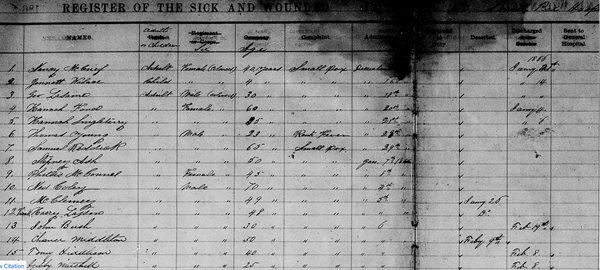SALT LAKE CITY, June 18, 2014 (GLOBE NEWSWIRE) -- In recognition of Juneteenth, FamilySearch announces the online publication of additional Freedmen's Bureau records—popular historic sources for those doing African American research that extends back to the Civil War period when slavery was abolished in the United States. Juneteenth is an important historical and joyous African-American holiday celebrated by millions and commemorates the abolition of slavery. It begins June 19 and lasts at least that day or a week or an entire month. The latest Freedmen's Bureau records added to FamilySearch.org's historical record collections are for Arkansas, Delaware, District of Columbia, Maryland, North Carolina, Texas, and Virginia.
The Juneteenth celebration commemorates the June 19, 1865, arrival of General Gordon Granger and 2,000 troops arriving in Galveston, Texas, enforcing the freeing of the slaves. The celebration of Juneteenth (Emancipation Day) began in the streets of Galveston by the former slaves and is now celebrated throughout the nation every year on the same date by millions of people.
In March of 1865, the Federal Government had created the Bureau of Refugees, Freedmen, and Abandoned Lands—the Freedmen's Bureau. The Freedmen Bureau's records include documentation of the legalization of marriages entered into during slavery, labor contracts (the beginning of share cropping), military payment registers, hospital logs, former slave owners, the number of children, and other details from the time of slavery—tremendous resources for those doing family history research from this period.
Robin Foster, a National Genealogy Examiner and a member of the South Carolina Genealogical Society, says, "The Freedman Bureau records are crucial to tracing your African American genealogy back past 1870. Until now, we had to travel to national, state, or local archives to have any hope of finding records. With FamilySearch, many of those records can be seen online on your home computer."
FamilySearch.org published the South Carolina bureau records in December 2013. FamilySearch published the popular Freedmen's Bank Records in 2001.
The new online additions are currently viewable as digital images of the original records. As FamilySearch's online volunteers complete indexing them, the searchable name index will be added to the digital images.
Foster says, "All these [Freedmen Bureau] records were created by Bureau offices in Washington, DC, and state, district, or field offices. The district or field offices were local points of contact for services. These records are so valuable because they create the bridge from before the Civil War to the 1870s. They provide names; dates of birth, marriage, and death; and clues to past slave owners and locations."
Janis Forté, a lecturer, author, and publisher, and Recording Secretary of Afro-American Genealogical and Historical Society of Chicago, stresses the importance of these latest additions to the Freedmen Bureau records collections now on FamilySearch.org, "This enables all researchers to have access to Freedmen Bureau records at no cost, any time."
Forté has personally experienced the value of these records. "In one instance, a Bureau record took me back three generations, even mentioning daughters' names and their married names. I discovered a great-great uncle had two marriages, one I didn't know about. These records cover a transitional period that is hard to imagine. People went from being completely dependent on someone to having to take care of themselves. People who hadn't been allowed to learn to read or write now had to compete with the rest of society. The Freedmen Bureau, Bank, and Societies helped bridge that gap with everything from hospitals to schools, labor contracts to insurance. Now, their records bridge the genealogical gap from slavery to freedom."
Joan Healy, research consultant with the Family History Library in Salt Lake City, explains the Freedmen's Bureau had vast responsibilities and therefore abundant records. "The goal of the Bureau was to help 4 million slaves make the transition to freedom. They provided services including rations, medical care, employment assistance, and support for education. Two hundred hospitals were built and 4,000 schools were established."
Foster encourages everyone to engage in family research. "When you're getting started and need some direction, find a family history center, FamilySearch center, or local library with a genealogy section, and look for records tied to localities. Organize your findings by putting what you know on FamilySearch.org. Then search the records there. FamilySearch.org provides more immediate results.
Foster continues, "Search, record, and share are the three pillars of good family research. Be sure you share. That gives to others and brings information from them. Since I can remember, we had family come visit. I wanted to know about them and remembered every detail. My daughter shouldn't grow up without knowing the family stories and being true to the name they gave us."
Helpful Online Information:
Getting Started with Your Family History
Find a Local FamilySearch Center
More about Freedmen Bureau Records
Robin Foster's blog
The Afro-American Genealogical and Historical Society of Chicago
About FamilySearch
FamilySearch International is the largest genealogy organization in the world. FamilySearch is a nonprofit, volunteer-driven organization sponsored by The Church of Jesus Christ of Latter-day Saints. Millions of people use FamilySearch records, resources, and services to learn more about their family history. To help in this great pursuit, FamilySearch and its predecessors have been actively gathering, preserving, and sharing genealogical records worldwide for over 100 years. Patrons may access FamilySearch services and resources free online at FamilySearch.org or through over 4,600 family history centers in 132 countries, including the main Family History Library in Salt Lake City, Utah.
Photos accompanying this release are available at:
http://www.globenewswire.com/newsroom/prs/?pkgid=25982
http://www.globenewswire.com/newsroom/prs/?pkgid=25983

